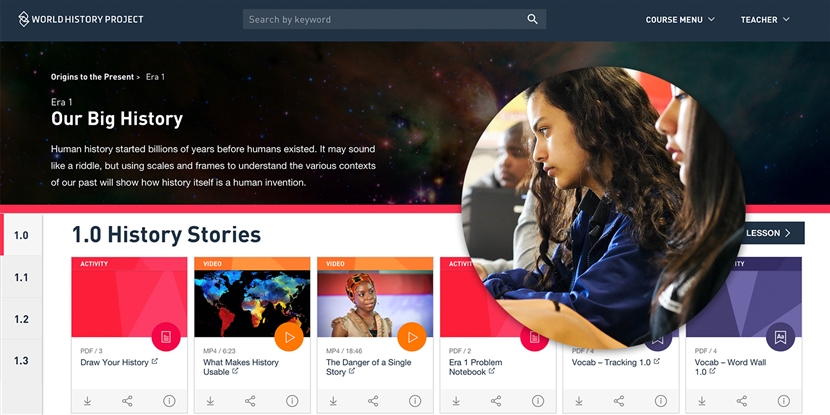Rob Valenti, WHP Teacher
New York, USA
I’m an avid listener of podcasts. I love to bounce around and listen in on topics that are both within and outside my discipline. I recently heard one podcast where the host said, “Saying I don’t know could be the most empowering thing a person could say if it fosters a spirit or desire to learn.” This resonated with me immediately. As a classroom teacher, I love the teachable moment that might answer a question for a student or, even better, drive inquiry for that student to discover the answer on their own. But, as I’ve reflected on my pilot year as part of the World History Project, it really got me thinking about that question as it relates to me. When am I vulnerable enough to wade into the waters of the unknown? How do I challenge myself to learn new things? Can I shift from a deliverer of content to a facilitator of learning, and by doing so, act as a model lead learner to my students?
Exposing my students to such a robust curriculum with the tools, frames, and detail that have been put into the creation of the World History Project course has changed how they experience my classroom. I have truly shifted my pedagogical beliefs and practices as a teacher. The most meaningful lesson I’ve taken away from using the WHP materials is that my students can handle way more than I thought they could. I’ve worked diligently to put them into the position of becoming the expert on a topic themselves, as opposed to me being the only expert in the room. Giving them that type of agency has been a very rewarding experience, not only for my students, but also myself. I feel that the one-way street of them learning from me is no longer the case when they take ownership of what they do, how they express themselves, and what they create. For example, earlier in the year, my students and I watched Chimamanda Ngozi Adichie’s TED Talk, “The Danger of a Single Story." Adichie’s talk is riveting, and she does such a good job of creating a narrative around why it’s important to have different perspectives when looking at stories. I assumed that my students could handle the premise but was blown away by their ability to identify with the main ideas of vulnerability, identity, and dignity. They did this by connecting the concepts to their own lives, our community, and the world. To show them my own vulnerability, I told them that I’ve realized that in the past, I probably taught a single narrative to my classes, and then I explained how I’ve modified my practice, as Adichie suggests.
When you teach WHP, you’ll see curiosity return to students, even those who have had it drained (or bored) out of them. Even though WHP provides a full curriculum with ready-made lessons and materials, all of which have been streamlined, tested, and polished, it still leaves the flexibility and freedom to create the unique experiences we want in our own classrooms. The curriculum doesn’t have to be used as is—“out of the box.” Choose, adapt, and modify activities and materials based on your students. Have fun with it together. Use the online teacher community to engage with other WHP teachers. Embrace becoming a lead learner and go on that journey with your students. Teaching WHP has been such a rewarding experience for me and my students as we worked together analyzing the past, the present, and the future. We’ve even answered a whole lot of “I don’t knows” in between.
About the author: Rob Valenti is a public high school social studies teacher at Springville-Griffith Institute, in Springville, NY. Over the course of 12 years, he has taught global history and geography to ninth- and tenth-grade students and economics at the twelfth-grade level. In 2013, he begin teaching the Big History Project course, which he taught as a senior elective. In 2018, he became a founding teacher of the World History Project course.
 For full access to all OER Project resources AND our amazing teacher community,
For full access to all OER Project resources AND our amazing teacher community, 
-

Deborah Hoggan
-
Cancel
-
Up
0
Down
-
-
Reply
-
More
-
Cancel
-

Rob Valenti
in reply to Deborah Hoggan
-
Cancel
-
Up
0
Down
-
-
Reply
-
More
-
Cancel
Comment-

Rob Valenti
in reply to Deborah Hoggan
-
Cancel
-
Up
0
Down
-
-
Reply
-
More
-
Cancel
Children